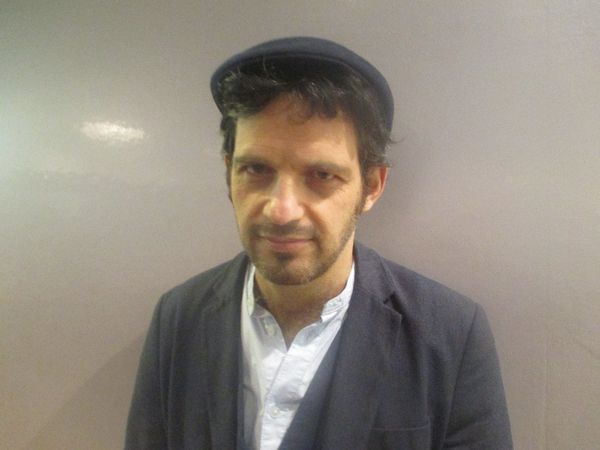 |
| Géza Röhrig: "This is kind of when my childhood was over." Photo: Anne-Katrin Titze |
László Nemes' trenchant Son Of Saul (Saul Fia), co-written with Clara Royer, cinematography by Mátyás Erdély, sound design Tamás Zányi and an unforgettably unsettling performance by Géza Röhrig as Saul Ausländer, clothed by Edit Szücs, today received an Oscar nomination for Best Foreign Language Film. Deniz Gamze Ergüven's Mustang, Naji Abu Nowar's Theeb, Ciro Guerra's Embrace Of The Serpent and Tobias Lindholm's A War were also honoured.
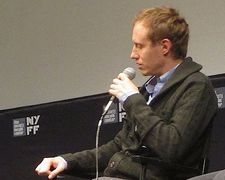 |
| Son Of Saul director László Nemes at the New York Film Festival Photo: Anne-Katrin Titze |
Slavoj Žižek, Roberto Benigni's Life Is Beautiful, Steven Spielberg's Schindler's List impacting Stanley Kubrick's The Aryan Papers, what Quentin Tarantino's Inglourious Basterds has in common with The Sound Of Music, the profound impact of a visit to Auschwitz at age 17, the fragility of civilisation, the danger of big questions with small answers, Disney-fication versus finding a new grammar, Theodor Adorno, and how the Sonderkommando has turned into software were part of my conversation with Géza Röhrig.
He told me earlier: "When I was 12, I found in a shoe box a bunch of photos on the top shelf in a closet. And I could tell immediately that these photos - by the colouring which was brownish, silverish - that these photos are old photos, pre-war photos, perhaps, and I haven't seen them before. So I confronted my grandfather during a chess game, saying 'who are these people?'"
Anne-Katrin Titze: The revelation at twelve. Your grandfather explained?
Géza Röhrig: Yes, my grandfather explained and from that time on, I knew right away that there is something buried there. This is substantial. This is kind of when my childhood was over. And I started, of course, to do my own research and investigation and I knew that I wanted to see this place. So at age 17, I went to Auschwitz.
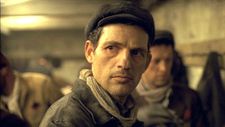 |
| Saul Ausländer (Géza Röhrig) |
AKT: The family you saw in the photo was sent to Auschwitz?
GR: Yes, his parents, his younger brother, his older sister pregnant - they all did not come back. And he and his brother were the only ones who survived. When I went to the place myself, the camp in Poland in 1987, what meant to be a one day visit, turned out to be a month. I rented a room in Oswiecim, they call this town near Auschwitz, and I kept returning every day from 9-5, I was there. It wasn't because I was slow reading the exhibition.
AKT: I didn't think so.
GR: It's just the sanctity, the radiation, the aura of the place - I felt that I belonged there. And I felt that I grew up there. I felt the first time in my life that I am in reality. This is not my world. I'm not in my world anymore, I'm actually in the world. This is it. This feeling never left me. It never got quiet in me. What I'm trying to say, is that I had a deep and personal connection with this subject matter. I know for sure that László knew that. The questions, the full potentiality of human evil, and the conclusions that I over the years I arrived at when thinking about the Holocaust is - realising how fragile a civilisation is in the face of moral nihilism.
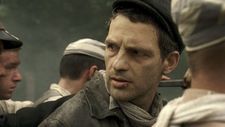 |
| Géza Röhrig on Saul Ausländer: "I had a deep and personal connection with this subject matter." |
And of course the unanswered questions. Because when you have really big questions, there's a great danger that you come up with small answers. These are things that I'm struggling with, of course, for the rest of my life. But I felt, when I finished the script, that this movie is a very important one for the following reason. Two out of every three Jews were murdered in Europe during the Holocaust.
All the films I saw - and I'm sure they are all well-meant - they were all dealing with the lucky third who made it. We wanted to make a movie about the first two. I think, if we want to heal, if we want to be healed, we have to admit for the Holocaust for what it is. We can't Disney-fy, we can't sugarcoat it. I think, unfortunately this topic has been used and abused for entertainment purposes. Used as historical background, stories were made around and in the Holocaust that had nothing to with it.
AKT: When you think about the timing of Schindler's List keeping Stanley Kubrick from making The Aryan Papers. It is one of the haunting films that was never made. Schindler's List opened the floodgates, I think, for a lot of what you call Disney-fied approaches.
_225.jpg) |
| Géza Röhrig: "What we wanted to do is to make a movie that is uncompromising." |
GR: Then came Life Is Beautiful.
AKT: Oh, that is a film I detest!
GR: And then came, to be honest, the movie I hate the most. Inglourious Basterds by Tarantino. Basically what it does, is it makes Nazis out of Jews. The same cruelty and violence the Nazis did, now he makes it a group of Jews and thinks that's a solution? To be as cruel as they were and use a baseball bat and hit a Nazi's head off? I think that this genre, the so-called Holocaust cinema…
AKT: Sorry to interrupt you, but what you just said about the reversal made me think of Slavoj Žižek's comments about The Sound Of Music. He points out the visual reversal in the portrayal of the Jews and Nazis in this film.
GR: It's funny that you mention that because I'm just back from Ljubljana. I think Žižek is probably the most known Slovenian person on earth, even from the past.
AKT: Yes, he probably is. Did you meet with him? I just heard his talk on Hegel here at NYU.
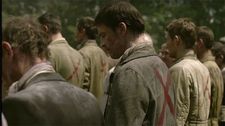 |
| Géza Röhrig: "If we want to be healed, we have to admit for the Holocaust for what it is." |
GR: No. It's funny. I have all his books but I never had the chance to meet him. I wish. I find his ideas very provoking and very fertilising. I think we are on the same page, you and I that this genre, the Holocaust genre is by and large very unsuccessful and falsifying even.
What we wanted to do is to make a movie that is uncompromising. We understood and we are very pleasantly surprised by the reception of this movie. I understand, especially in America which is so far from the killing zone, so people don't have recollection of any of this, most of them. Generally speaking, they find this topic too dark.
AKT: The subject?
GR: Yeah - of course it is too dark. If it's too dark, then you have to make a decision. Don't make a movie about it or find an angle and forge a cinematic language. And I don't mean just new vocabulary or style but new grammar, just like we did with the visuals and the sound. There is a way to do it. It's impossible but it's necessary. If we are going to be quiet about genocide, guess what?
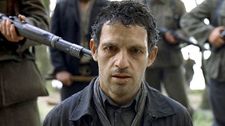 |
| Géza Röhrig: "How fragile a civilisation is in the face of moral nihilism." |
A lot of people would be happy about that, right? All the fundamentalists, the new Nazis, you name it. I think if it's done with really a personal urge and motivation that comes from a deep place, then it's not a tabu. That's why we wanted to go right into the epicentre of the place, where most movies did not dare to go.
AKT: Of course, there is the famous Adorno quote that it is barbaric to write poetry after Auschwitz which can easily be misused as an excuse not to attempt to go there at all. To be honest, the first few moments watching Son of Saul, I thought I couldn't take it. I was so afraid of where you were going to lead me. And then I and the entire audience, we get used to it, because we are nevertheless comfortably sitting at the New York Film Festival press screening. It is also a film about how we get used to the most horrible things, I felt.
GR: And I have news for you. Why Auschwitz and the Holocaust is so important. Because it is the first modern genocide. In other words, the Sonderkommando, the moral issue here is that for the first time in history, the murderers are both physically removed from the direct outcome of their actions. There is this one Nazi in a well-ironed uniform, sitting in a Red Cross ambulance car and he drives to the gas chambers.
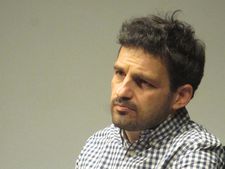 |
| Géza Röhrig at the New York Film Festival Photo: Anne-Katrin Titze |
He puts on a gas mask, he takes the poison out and he pours it in, and in 20 seconds he has left. He doesn't hear the people cry and scream. He doesn't smell the odour and the stench. He doesn't have to clean up and burn them. The same thing - look at the world in 2015. Look at the drones and the pilotless bombers now. Right now, there's not even the Sonderkommando. The Sonderkommando became a software. In this day and age, when technology and science are so advanced…
AKT: Which brings us back all the way around to Steve Jobs, where we started our conversation.
GR: Exactly. So what is happening now is that somewhere 100 metres down in a bunker under the Navajo desert someone is sitting down and he has a mouse in his hand and he clicks. And by that click on another continent a bomb is dropped. And you don't know or face the consequences of your actions and because of that you don't feel guilty. Murder was always there, it's part of human condition. But there's a new brand of killer emerged from the Holocaust.
A killer who feels innocent. That is to me, I think, the most appalling and the most demonic aspect of Nazism. It's this system which basically wanted to do the following - how can we kill the most amount of Jews with the least amount of Germans being involved. In other words, let the dirty work be done by them. That is the type of thing that is going on in this world nowadays too. I feel that it's fair to say.
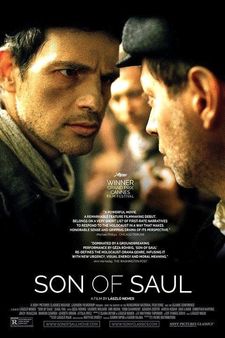 |
| Son Of Saul US poster |
It pains me but I think no real plausible case can be made to say that we turned the page over Auschwitz. 70 years after, I still believe that we are on the same page. It might be, it will be different targets, different perpetrators, but unfortunately, what it comes down to for me is this road. We can go faster from A to B, we live longer, blah, blah, blah. There are so many good things happening. But eventually, at the end of the day, the world cannot be a better place unless the people are better in it.
And I'm fully unconvinced that we are better than 70 years ago. Basically, the movie wanted to be an appeal for constant reflection, an appeal for vigilance. Authority in general and political power in particular, if it goes unchecked, anything can happen. It is up to us as citizens - we have to protest and we have to resist. Otherwise, we are going to be stuck forever in this.
Read why Robert De Niro or Jack Nicholson would not have had an advantage over Géza Röhrig playing Saul Ausländer.
László Nemes on organisation and chaos; The precise sound design by Tamás Zányi and Claude Lanzmann's The Patagonian Hare, Shoah and The Last Of The Unjust.
The Oscar for Best Foreign Language Film will be handed out on February 28.
Son of Saul is in theaters in the US and will open in the UK on April 29.





















